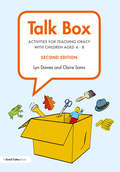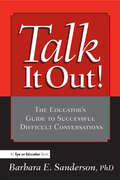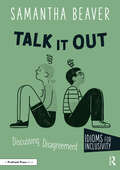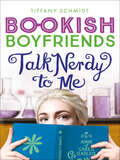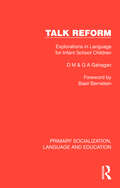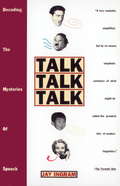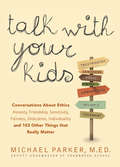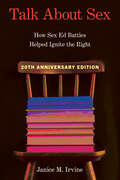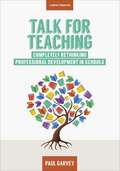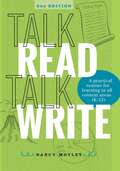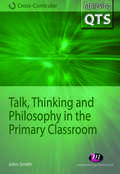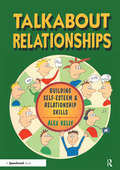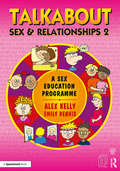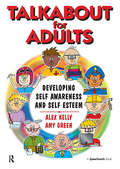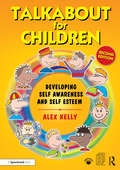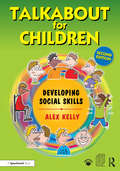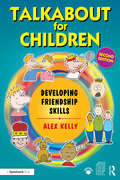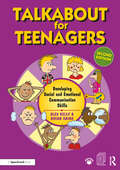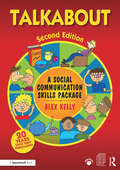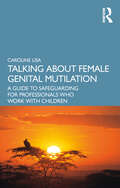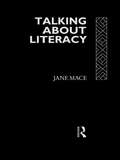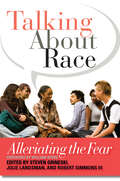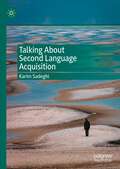- Table View
- List View
Talk Box: Activities for Teaching Oracy with Children aged 4–8
by Lyn Dawes Claire SamsTalk Box supports teachers implementing the new curriculum, who are looking for fresh ideas with a focus on teaching talk skills, encouraging discussion and developing articulate children. It sets out different types of teaching involving children learning collaboratively through discussion with peers and centres on step-by-step lesson plans to develop hidden potential across the entire classroom. At the heart of the lesson plans is the ‘talk box’ - a collection of interesting objects which provide a focus for class discussion and where the activities are based on these linked ideas: • Young children need their teachers to help them make sense of the world; • The most effective medium for explaining, discussing, describing with children, is talk; • Children learn very well from one another when taught how to do so, and are a good resource for one another in the classroom; • Children may be able to talk, but they are not often aware what sort of talk can help them to get the best from their education; • Direct teaching of essential talk skills and understanding is straightforward and should be undertaken in school classrooms. The numerous lesson plans included in this book are each built around specific learning objectives for speaking and listening and cover subjects such as literacy, numeracy, science, citizenship, ICT and Computing. Each lesson includes a resources list and photocopiable worksheets and range from whole class to small group work. This book will help you teach children to engage in the educationally effective kind of discussion known as Exploratory Talk, where everyone’s viewpoint is considered, opinions are justified with reasons, and decisions are made together. This new edition includes updated curriculum links, new research findings, a home-school link section and contain additional EAL and SEN materials.
Talk It Out!: The Educator's Guide to Successful Difficult Conversations
by Barbara SandersonThis book helps you deal with the conflicts and confrontations which occur in your school--between you and your teachers and between teachers themselves. With detailed examples and scenarios, Talk it Out! provides tips and strategies to help you- acquire skills and confidence in handling conflicts- avoid becoming a victim- avoid becoming a villain- know when you've been successful.This book demonstrates a large number of useful techniques, such as how to - tell the truth without blame or judgment- listen to the other person's point of view- change tactics when you do not get the response you want.This book will show you how to reduce dissent in your school by clarifying your expectations and develop positive relationships (even if you do not like the other person).
Talk It Out: Discussing Disagreement (Idioms for Inclusivity)
by Samantha BeaverTo get the complete Idioms for Inclusivity experience, this book can be purchased alongside four others as a set, Idioms for Inclusivity: Fostering Belonging with Language, 978-1-032-28635-8. Informed by sociolinguistic research, yet written accessibly, Talk It Out challenges readers to investigate disagreeing with someone as it relates to both language-use and inclusivity. This engaging and delightfully illustrated book invites students to engage with concepts such as: the cultural meaning of the idiom "talk it out" Facework and Politeness Theory, two frameworks that linguists use to research and understand disagreements why it can be so hard to like someone who disagrees with you why the expectation to "talk it out" could make someone feel excluded and how understanding the way language works can help us learn to be more inclusive. Featuring practical inclusivity tips related to integrating learning into daily conversations, this enriching curriculum supplement can be used in a Language Arts setting to learn about figurative language; in a Social Studies setting to discuss diversity, equity, inclusion, and belonging; or as an introduction to linguistics for students ages 7-14.
Talk Nerdy to Me: A Bookish Boyfriends Novel (Bookish Boyfriends Ser.)
by Tiffany SchmidtA strait-laced teen finds herself living an Anne of Green Gables romance in this swoon-worthy tale by the author of The Boy Next Story. Eliza Gordon-Fergus is an expert rule-follower. She has to be; her scientist parents dictate her day-to-day decisions, and forbid her from dating. Which is why she finds Curtis Cavendish maddening. He’s never punished for his class clown antics—and worse, his mischief actually masks brilliance. Like, give-Eliza-a-run-for-valedictorian brilliance.When Eliza reads Frankenstein for English class, she’s left feeling more like an experiment than a daughter. Curtis agrees to trade her Anne of Green Gables under one condition: She has to beat him at the science fair. Eliza knows they’re supposed to be competing, but the more time they spend together, the more she realizes she’s in over her head. Because one thing’s certain about Curtis: He makes Eliza want to break all the rules.“Fans will be thrilled with this third installment in the Bookish Boyfriends series that focuses on brainy Eliza and her intellectual equal. . . . Sure to leave romantics with an afterglow.” —Kirkus Reviews
Talk Reform: Explorations in Language for Infant School Children (Primary Socialization, Language and Education)
by D. M. Gahagan G. A. GahaganOriginally published in 1970, Talk Reform describes the development of an exploratory language enrichment programme devised by the authors and carried out by teachers in a group of primary schools in a working-class area of London.Inspired by Bernstein’s theory of different language codes and their relation to educational underachievement, the authors devised a series of situations in the classroom as preconditions for extending language use. Their aim was to reorient the reader to the social functions of language, so that teachers who understood the ideas behind this programme would be able to carry out the activities described as well as those they may have thought up for themselves. The kinds of problems encountered when trying to judge the value of intervention and change in the classroom are discussed and illustrated, from the authors’ own research. The authors put forward the view that the social and linguistic skills that could be acquired in the way outlined in their book were crucial to the advancement of the working-class child in the social system. Today it can be read in its historical context.
Talk Talk Talk: Decoding the Mysteries of Speech
by Jay IngramWith a mixture of erudition and humor, Canadian radio personality Jay Ingram discusses the sociology of talking: the dynamics of conversation, men and women's different propensities for interrupting, and even the proper use of "you know." But he also delves into the mystery-riddled physiology of talking. While we now know that certain areas of the brain seem to control specific aspects of speech--from articulating words to creating meaningful sentences--how do scientists explain the extraordinary case of the young stroke victim who lost only the words for fruits and vegetables? Is it possible that the ability to talk is actually encoded in our genes, as some scientists believe?From the language roots of North America to the speech differences between Neanderthals and Cro-Magnons, from modern children creating whole new languages in one generation to Freudian slips, from talking to yourself to speaking in tongues, Talk, Talk, Talk covers the gamut of humankind's most enigmatic and intriguing skill. Impeccably researched, lively and accessible, Talk, Talk, Talk is a book you won't be able to keep quiet about.
Talk With Your Kids: Conversations About Ethics -- Honesty, Friendship, Sensitivity, Fairness, Dedication, Individuality -- and 103 Other Things That Really Matter
by Michael ParkerA guide for parents to help their children better understand the world around them by helping them think through the questions they face regarding honesty, friendship, sensitivity, fairness, dedication, individuality and 103 other character-building issuesMany families and almost all schools spend a great deal of time developing children academically, but studies show tht scholastic achievement is not the only key to future success. Developing non-cognitive skills, which children often learn from their parents, is equally relevant.Talk with Your Kids prompts thoughtful and effective discussion between parents and children by posing 109 open-ended questions. Many of the questions reflect situations immediately relevant to kids, such as cyber-bullying, cheating in school or in sports, accepting differences, illegal music downloads, what defines lying, and making choices about drugs and sex.Other questions ask kids to consider larger dilemmas, such as medical ethics and medical testing, declaring war, crime and punishment, eating meat, and more. Parker also offers suggestions to parents on how to keep the conversations going and encourage kids to think more deeply about an issue. Throughout the book are questions based on the theories of famous ethicists and philosophers, including John Stuart Mill, Immanuel Kant, Thomas Hobbes, and Jean Jacques Rousseau.Best-selling parenting books such as How Children Succeed and Nurtureshock emphasize the importance of strong values in a child. The conversations in Talk with Your Kids help parents achieve this goal.
Talk about Sex: How Sex Ed Battles Helped Ignite the Right (Sexuality Studies)
by Janice IrvinePraise for Talk about Sex “Must reading for scholars, sexuality researchers, activists, and public policy and public health planners engaged in efforts to promote education on sex, sexually transmitted diseases, and HIV infection prevention for adolescents in schools.”—JAMA Talk about Sex is a rich social history about the political transformations, cultural dynamics, and emotional rhetorical strategies that helped the right wing manufacture controversies on the local and national levels in the United States. Although the emergence of a politicized Christian Right is commonly dated at the mid-seventies, with the founding of groups like the Moral Majority, Talk about Sex tells the story of a powerful right-wing Christian presence in politics a full decade earlier. These activists used inflammatory sexual rhetoric—oftentimes deceptive and provocative—to capture the terms of public debate, galvanize voters, and reshape the culture according to their own vision. This 20th Anniversary Edition includes a new preface and epilogue by the author that examines current controversies over public education on sexuality, gender, and race. Demonstrating how the right wing draws on the cultural power of sexual shame and fear to build a political movement, Talk about Sex explores the complex entanglements of sexual knowledge, politics, and discourses.
Talk about Sex: How Sex Ed Battles Helped Ignite the Right (Sexuality Studies)
by Janice IrvinePraise for Talk about Sex “Must reading for scholars, sexuality researchers, activists, and public policy and public health planners engaged in efforts to promote education on sex, sexually transmitted diseases, and HIV infection prevention for adolescents in schools.”—JAMA Talk about Sex is a rich social history about the political transformations, cultural dynamics, and emotional rhetorical strategies that helped the right wing manufacture controversies on the local and national levels in the United States. Although the emergence of a politicized Christian Right is commonly dated at the mid-seventies, with the founding of groups like the Moral Majority, Talk about Sex tells the story of a powerful right-wing Christian presence in politics a full decade earlier. These activists used inflammatory sexual rhetoric—oftentimes deceptive and provocative—to capture the terms of public debate, galvanize voters, and reshape the culture according to their own vision. This 20th Anniversary Edition includes a new preface and epilogue by the author that examines current controversies over public education on sexuality, gender, and race. Demonstrating how the right wing draws on the cultural power of sexual shame and fear to build a political movement, Talk about Sex explores the complex entanglements of sexual knowledge, politics, and discourses.
Talk for Teaching: Completely Rethinking Professional Development In Schools
by Paul GarveyPaul Garvey uses his experience as a teacher, inspector and a National Strategies consultant to advise educators and schools on how his Talk For Teaching method can help them take control of their Professional Development - without it increasing costs or taking up valuable lesson time. Educators learn how 'Talk for Teaching' can be applied, by utilising experiences from all members of your teaching staff from TAs to heads. All play a vital role in the improvement of the teaching quality throughout the school, whilst improving morale as well. Full of experiences from teachers, headteachers and inspectors, as well as Garvey's own personal experiences, this is not a book to be missed for anyone looking to journey towards teaching excellence. Talk for Teaching clearly works. This is what Ofsted said about the result of putting Talk for Teaching at the heart of a school's programme for improving the quality of teaching. The quote is taken from Barnsole Primary's Ofsted report in April 2016: "Together with the deputy headteacher, the headteacher has led the 'Talk for Teaching' programme that has been an instrumental part of transforming the quality of teaching over time. The high-quality teaching in this school now leads to outstanding outcomes for pupils. The school has used this professional development programme to involve leaders, teachers, teaching assistants, governors and other members of the school staff in observing teaching together. They have detailed conversations about the effectiveness of what is seen and how it can be improved. Staff discuss the quality of teaching regularly and freely share ideas about what works well with colleagues."
Talk for Teaching: Completely Rethinking Professional Development In Schools
by Paul GarveyPaul Garvey uses his experience as a teacher, inspector and a National Strategies consultant to advise educators and schools on how his Talk For Teaching method can help them take control of their Professional Development - without it increasing costs or taking up valuable lesson time. Educators learn how 'Talk for Teaching' can be applied, by utilising experiences from all members of your teaching staff from TAs to heads. All play a vital role in the improvement of the teaching quality throughout the school, whilst improving morale as well. Full of experiences from teachers, headteachers and inspectors, as well as Garvey's own personal experiences, this is not a book to be missed for anyone looking to journey towards teaching excellence. Talk for Teaching clearly works. This is what Ofsted said about the result of putting Talk for Teaching at the heart of a school's programme for improving the quality of teaching. The quote is taken from Barnsole Primary's Ofsted report in April 2016: "Together with the deputy headteacher, the headteacher has led the 'Talk for Teaching' programme that has been an instrumental part of transforming the quality of teaching over time. The high-quality teaching in this school now leads to outstanding outcomes for pupils. The school has used this professional development programme to involve leaders, teachers, teaching assistants, governors and other members of the school staff in observing teaching together. They have detailed conversations about the effectiveness of what is seen and how it can be improved. Staff discuss the quality of teaching regularly and freely share ideas about what works well with colleagues."
Talk, Read, Talk, Write
by Nancy MotleyThe Talk Read Talk Write approach helps students meet and exceed the state standards for learning in all subjects while also developing the literacy skills needed for success in the 21st century. This practical resource gives teachers (K-12) a step-by-step guide to implementing structured conversation, active reading, and high quality writing in any class. The book includes quick reference charts and graphic organizers, excerpts from actual classrooms, many example/non-example sections, sample lessons, and a discussion guide for campus book study.
Talk, Thinking and Philosophy in the Primary Classroom (Achieving QTS Cross-Curricular Strand Series)
by John SmithTalk, thinking and philosophy are crucial components of children′s learning. This book is a practical and readable guide to the ways in which teachers can provide children with the opportunities to develop and use these skills to their greatest effect. It begins by asking why talking and thinking should be taught and examines current approaches in this area. It goes on to look at how teachers can develop talking and thinking skills across the six Areas of Learning to help children gain confidence and deepen understanding.
Talkabout Relationships: Building Self-Esteem and Relationship Skills (Talkabout #Vol. 3)
by Alex KellyThe third title in the successful "Talkabout" series, "Talkabout Relationships" reflects current literature and research on developing relationships for people with learning disabilities, and aims, through groupwork, to improve self-esteem and relationship skills in people who are having difficulties in making or maintaining friends. This highly illustrated, practical resource: is designed to help teachers or therapists to work through self-esteem and relationship skills within a group setting in a structured way. It was originally written for young adults with a learning disability, it has also been used successfully with children with learning disabilities and those who present with social skills difficulties. Includes a staff rating assessment of a client's relationship skills and criteria for inclusion in a relationships group, as well as a self-esteem assessment and a self-rating assessment of relationship skills. This title contains illustrated, photocopiable group activities and worksheets to address self-image, identity and self-confidence as well as the different types of relationship, the qualities of friends and some of the skills involved in improving and developing relationships. Illustrated by the author, this hands-on groupwork resource is ideal for speech language therapists, teachers, occupational therapists, community learning disability nurses and anyone working in the field of learning disability.
Talkabout Sex and Relationships 2: A Sex Education Programme (Talkabout)
by Alex Kelly Emily DennisTalkabout Sex & Relationships 2 is a comprehensive toolkit for all therapists, educators and support staff who deliver sex education to people with special needs. It is intended primarily to support groupwork but activities can be easily adapted to suit the needs of individuals with varying abilities. The resource emphasises the importance of being well informed in regards to the physical, interpersonal and emotional aspects of sex; including body awareness, consent, sexual health and guidelines for a healthy sexual relationship. It is packed with practical activities which are designed to open up discussion around sensitive issues in a fun, informative and non-judgemental way. Each activity comes with guidance for practitioners on how to prepare for and delivery the sessions. Features include: guidelines to assess the suitability of students for the programme visually appealing and engaging activities with full colour illustrations photocopiable activities which can also be downloaded for free on the accompanying website template letters for parental permission in delivering the sessions This toolkit is the second in a two volume set, the first of which focuses on relationships. Created by Alex Kelly and Emily Dennis as part of the bestselling Talkabout series, this publication constitutes the most complete and trustworthy set of resources available for groupwork focussing on sex and relationships for people with special needs.
Talkabout for Adults (Talkabout)
by Alex Kellyalkabout Adults is a practical resource to help therapists or support staff to develop self-awareness and self-esteem in adults. It has been particularly aimed at adults with an intellectual disability (learning disability) or older children with special needs. It has been adapted from the Talkabout for Children: developing self-awareness and self-esteem book to be suitable for an older audience. This means that some of the activities are almost identical but a number of them have been adapted to be more appropriate. There are also some new activities such as the 'A book about me.' which enables the adults to make up a book over the course of the sessions that will summarise some keys personal facts. This can work well as an addition to a communication passport or equivalent, or can stand alone as an alternative. Talkabout for Adults is a stand-alone resource with approximately a year's worth of activities to develop self-awareness and self-esteem. It has 50 activities to do with adults and it has been successfully piloted at Speaking Space. It includes: a short assessment of self-awareness and self-esteem; a year's worth of work on self-awareness and self-esteem including 50 activities and some worksheets; practical suggestions to make your group work successful including 25 group cohesion activities, a plan for intervention, and forms for monitoring and evaluation. This resource continues to use the Talkabout hierarchical approach to teaching skills, that is, basic self-awareness skills are taught prior to more complex skills such as social skills and friendship skills. This also means that this resource is designed to be used logically from topic 1 through to topic 8. Most of the activities are more suited to working in a group setting but some of them can be adapted for one-to-one work. Alex Kelly is a speech and language therapist who specialises in working with children who have low self esteem, and difficulty with their social skills and friendship skills. She spent 23 years working as a speech and language therapist in the NNHS but now runs her own company - Alex Kelly Ltd. She provides social skills training and consultancy to schools and organisations across the UK and overseas. Her company also provides speech and language therapy in a number of special schools in eh south of England.
Talkabout for Children 1: Developing Self-Awareness and Self-Esteem (Talkabout)
by Alex KellyTalkabout for Children: Developing Self-Awareness and Self-Esteem is a bestselling professional workbook supporting educators and therapists who deliver social and relationship skills groups for children with social, emotional or behavioural difficulties. Self-awareness and self-esteem is an essential prerequisite to developing social skills and so this book is an excellent first step to any social skills programme. This resources creates the foundation of the Talkabout heirachy, where self-awareness comes before non-verbal skills and non-verbal comes before verbal, with assertiveness coming last. Resources include: an assessment framework planning and evaluation forms a three-term intervention plan for schools over 40 structured activity sessions focussing on self-awareness and self-esteem all the supplementary handouts and images needed to deliver the sessions. This second edition is presented with full-colour illustrations and handouts, and includes a new introduction by Alex Kelly reflecting on her own experiences of using the resources since they were first developed.
Talkabout for Children 2: Developing Social Skills (Talkabout)
by Alex KellyTalkabout for Children: Developing Social Skills is a bestselling professional workbook supporting educators and therapists who deliver social and relationship skills groups for children with social, emotional or behavioural difficulties. Social competence is an essential aspect of our quality of life and this resource will help to develop these skills in young children. This resources creates the second level of the Talkabout heirachy, where self-awareness comes before non-verbal skills and non-verbal comes before verbal, with assertiveness coming last. Resources include: an assessment framework planning and evaluation forms a three-term intervention plan for schools over 60 structured activity sessions focussing on social skills all the supplementary handouts and images needed to deliver the sessions. This second edition is presented with full-colour illustrations and handouts, and includes a new introduction by Alex Kelly reflecting on her own experiences of using the resources since they were first developed.
Talkabout for Children 3: Developing Friendship Skills (Talkabout)
by Alex KellyTalkabout for Children: Developing Friendship Skills is a bestselling professional workbook supporting educators and therapists who deliver social and relationship skills groups for children with social, emotional or behavioural difficulties. This resources creates the final level of the Talkabout heirachy, where self-awareness comes before non-verbal skills and non-verbal comes before verbal, with assertiveness coming last. Resources include: an assessment framework planning and evaluation forms a three-term intervention plan for schools over 25 structured activity sessions focussing on friendship skills all the supplementary handouts and images needed to deliver the sessions. This second edition is presented with full-colour illustrations and handouts, and includes a new introduction by Alex Kelly reflecting on her own experiences of using the resources since they were first developed.
Talkabout for Teenagers: Developing Social and Emotional Communication Skills (Talkabout)
by Alex Kelly Brian SainsTalkabout for Teenagers is a bestselling professional workbook supporting educators and therapists who deliver social and relationship skills groups for older children and young adults with social, emotional or behavioural difficulties. It is a complete group work resource that offers a hierarchical approach, with ready-made material to assist teaching social and relationship skills specifically to older children and young adults. Resources include: an assessment framework planning and evaluation forms 37 structured session guides focussing on self-awareness and self-esteem, body language, conversational skills, friendship skills and assertiveness all the supplementary handouts and images needed to deliver the sessions. This second edition is presented with full-colour illustrations and handouts, and includes a new introduction by Alex Kelly reflecting on her own experiences of using the resources since they were first developed.
Talkabout: A Social Communication Skills Package (Talkabout)
by Alex KellyThis core Talkabout manual is a practical resource essential for Speech and Language Therapists and other professionals who need to help people with special needs develop social skills. Over 60 activities form an extensive, structured social skills programme that can easily be adapted for use with children, adolescents and adults. Written by bestselling author and practising Speech and Language Therapist, Alex Kelly, this book sits at the centre of an internationally renowned series of resources supporting social skills. Contents include: a social skills assessment and intervention planning tool to help you identify the best way forward for each client or group over 60 activities focussing on body language, conversation and assertiveness 25 group cohesion activities to help you facilitate well-run, productive group sessions a wealth of handouts supporting the activities that can be freely downloaded and printed. This updated second edition of Talkabout sits alongside Talkabout for Teenagers and Talkabout for Adults, as well as three titles published for children (Developing Self Awareness and Self Esteem, Developing Social Skills and, Developing Friendship and Skills).
Talking About Female Genital Mutilation: A Guide to Safeguarding for Professionals who Work with Children
by Caroline LisaThis workbook is designed to be used to facilitate discussion and disseminate awareness amongst all professionals (social workers, teachers and health care professionals) who are required by law to report instances of Female Genital Mutilation (FGM). Suitable for use in group settings, it requires no prior knowledge of the subject, but is written in such a way for anyone to be able to facilitate a session with colleagues, which takes between one to three hours depending on the facilitator and group’s needs. Divided into five chapters, it shows how to facilitate a training session using the material, including being aware of how people may be triggered by this difficult subject. Providing activities to facilitate discussion, it explains terminology and provides explanation of different types of FGM, risk factors and legal aspects including mandatory reporting in certain regions. Designed to be concise, it will give busy professionals a quick and effective tool to disseminate information to as many colleagues as possible to allow them to develop understanding of a legal requirement of their job which has real and life-saving benefits for children.
Talking About Literacy: Principles and Practice of Adult Literacy Education
by Jane MaceTalking about Literacy re-examines dominant notions of what litreracy is, and challenges the problem-solution reflex to the issue (the problem is illiteracy: the solution is more literacy). Literacy has enormous emotional and political associations, and the job of literacy educator often concerns changing attitudes and challenging prejudices - whether in the form of publicity strategies, counselling new students, or in curriculum design. In short, adult literacy education means not only teaching courses like 'fresh start', 'basic skills', 'study skills', 'communication skills', 'language support' and 'return to study', but also designing strategies to encourage people to see that these courses may meet their own interests - and educating them and others to rethink their own negative attitudes to 'illiteracy'. The book looks in detail in at five principles put forward by Jane Mace as central to the education of people who often can read, but wish they could read better; who, technically can write, but have a desire to do so with more expression and coherence. These principles focus on five themes: context, inquiy, authorship, equality and community. Since it is all too easy for literacy education involving adults who do not have formal qualifications to stop short of teaching techniques for 'correct' writing, these principles mean taking seriously a view that adult students are writers as well as readers - that they have an entitlement to be read, as well as to read others.
Talking About Race: Alleviating the Fear
by Robert Simmons Julie Landsman Steven GrineskiWhat is it that gives many of us White people a visceral fear about discussing race?Do you realize that being able to not think about or talk about it is a uniquely White experience?Do you warn your children about how people might react to them; find store staff following or watching you; get stopped by the police for no reason?The students of color in your classroom experience discrimination every day, in small and large ways. They don’t often see themselves represented in their textbooks, and encounter hostility in school, and outside. For them race is a constant reality, and an issue they need, and want, to discuss. Failure to do so can inhibit their academic performance.Failure to discuss race prevents White students from getting a real, critical and deep understanding of our society and their place in it. It is essential for the well-being of all students that they learn to have constructive conversations about the history of race in this country, the impact of racism on different ethnic communities, and how those communities and cultures contribute to society. The need to model for our students how to talk openly and comfortably about race is critical in America today, but it is still an issue that is difficult to tackle.To overcome the common fear of discussing race, of saying “something wrong”, this book brings together over thirty contributions by teachers and students of different ethnicities and races who offer their experiences, ideas, and advice. With passion and sensitivity they: cover such topics as the development of racial consciousness and identity in children; admit their failures and continuing struggles; write about creating safe spaces and the climate that promotes thoughtful discussion; model self-reflection; demonstrate the importance of giving voice to students; recount how they responded to racial incidents and used current affairs to discuss oppression; describe courses and strategies they have developed; explain the “n” word; present exercises; and pose questions. For any teacher grappling with addressing race in the classroom, and for pre-service teachers confronting their anxieties about race, this book offers a rich resource of insights, approaches and guidance that will allay fears, and provide the reflective practitioner with the confidence to initiate and respond to discussion of race, from the pre-school and elementary classroom through high school.
Talking About Second Language Acquisition
by Karim SadeghiThis book includes interviews with fourteen internationally-acclaimed leading figures in Second Language Acquisition (SLA), who speak on seminal issues in the field as well as their own contributions to SLA scholarship. As well as covering the contributors’ backgrounds and academic achievements, the interviews also delve into their areas of expertise, current theoretical and practical considerations, and contemporary questions, developments and challenges in SLA. The author probes their views on current topics including input and interaction, vocabulary acquisition, teaching pronunciation, writing development, syntactic processing, multilingualism, L1 attrition, complex dynamic systems, processing instruction, instructed second language acquisition, and technology in language teaching. An introduction by the author draws out the key themes and debates in the field today, and highlights areas for future research and further exploration, and a foreword is provided by Rod Ellis. This book will be of interest to students and scholars of Applied Linguistics, Teacher Education and Methodology, and Second and Foreign Language Education.
